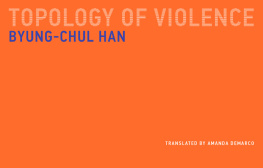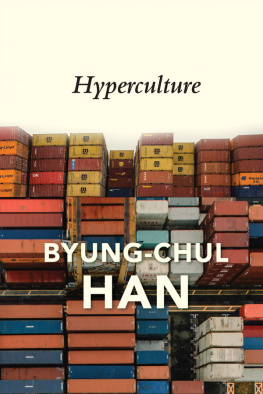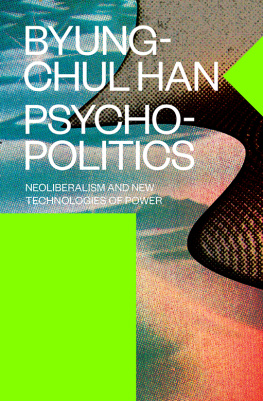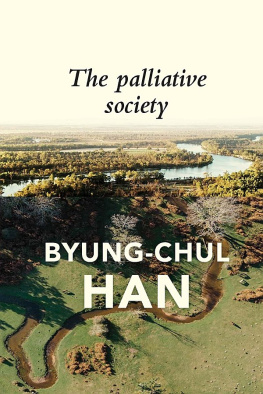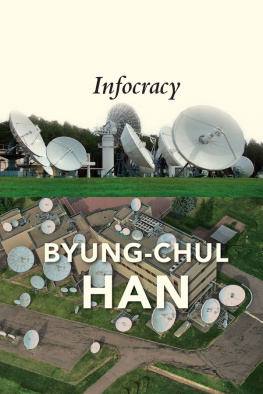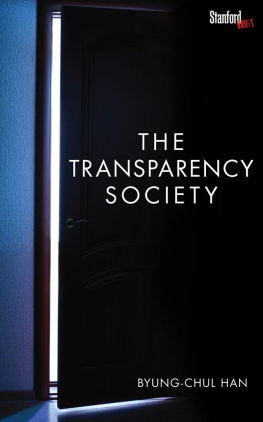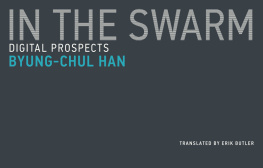THE BURNOUT SOCIETY
BYUNG-CHUL HAN
Translated by ERIK BUTLER
stanford briefs
An Imprint of Stanford University Press
Stanford, California
Stanford University Press
Stanford, California
English translation 2015 by the Board of Trustees of the Leland Stanford Junior University.
All rights reserved.
The Burnout Society was originally published in Germany:
Byung-Chul Han: Mdigkeitsgesellschaft. Berlin 2010 MSB Matthes & Seitz Berlin Verlagsgesellschaft mbH, Berlin 2010. All rights reserved by and controlled through Matthes & Seitz Berlin Verlag.
The translation of this work was supported by a grant from the Goethe-Institut which is funded by the German Ministry of Foreign Affairs.

No part of this book may be reproduced or transmitted in any form or by any means, electronic or mechanical, including photocopying and recording, or in any information storage or retrieval system without the prior written permission of Stanford University Press.
Printed in the United States of America
on acid-free, archival-quality paper
Library of Congress Cataloging-in-Publication Data
Han, Byung-Chul, author.
[Mdigkeitsgesellschaft. English]
The burnout society / Byung-Chul Han ; translated by Erik Butler.
pages cm
Translation of: Mdigkeitsgesellschaft.
Includes bibliographical references.
ISBN 978-0-8047-9509-8 (pbk. : alk. paper)
1. Mental fatigueSocial aspects. 2. Burn out (Psychology)Social aspects. 3. Depression, MentalSocial aspects. I. Butler, Erik, 1971 translator. II. Title.
BF482.H35513 2015
302'.1dc23
2015020750
ISBN 978-0-8047-9750-4 (electronic)
Typeset by Classic Typography in 10/13 Adobe Garamond
CONTENTS
NEURONAL POWER
Every age has its signature afflictions. Thus, a bacterial age existed; at the latest, it ended with the discovery of antibiotics. Despite widespread fear of an influenza epidemic, we are not living in a viral age. Thanks to immunological technology, we have already left it behind. From a pathological standpoint, the incipient twenty-first century is determined neither by bacteria nor by viruses, but by neurons. Neurological illnesses such as depression, attention deficit hyperactivity disorder (ADHD), borderline personality disorder (BPD), and burnout syndrome mark the landscape of pathology at the beginning of the twenty-first century. They are not infections, but infarctions; they do not follow from the negativity of what is immunologically foreign, but from an excess of positivity. Therefore, they elude all technologies and techniques that seek to combat what is alien.
The past century was an immunological age. The epoch sought to distinguish clearly between inside and outside, friend and foe, self and other. The Cold War also followed an immunological pattern. Indeed, the immunological paradigm of the last century was commanded by the vocabulary of the Cold War, an altogether military dispositive. Attack and defense determine immunological action. The immunological dispositive, which extends beyond the strictly social and onto the whole of communal life, harbors a blind spot: everything foreign is simply combated and warded off. The object of immune defense is the foreign as such. Even if it has no hostile intentions, even if it poses no danger, it is eliminated on the basis of its Otherness.
Recent times have witnessed the proliferation of discourses about society that explicitly employ immunological models of explanation. However, the currency of immunological discourse should not be interpreted as a sign that society is now, more than ever, organized along immunological lines. When a paradigm has come to provide an object of reflection, it often means that its demise is at hand. Theorists have failed to remark that, for some time now, a paradigm shift has been underway. The Cold War ended precisely as this paradigm shift was taking place. Such difference lacks the sting of foreignness, as it were, which would provoke a strong immunoreaction. Foreignness itself is being deactivated into a formula of consumption. The alien is giving way to the exotic. The tourist travels through it. The touristthat is, the consumeris no longer an immunological subject.
Consequently, Roberto Esposito makes a false assumption the basis of his theory of immunitas when he declares:
The news headlines on any given day in recent years, perhaps even on the same page, are likely to report a series of apparently unrelated events. What do phenomena such as the battle against a new resurgence of an epidemic, opposition to an extradition request for a foreign head of state accused of violating human rights, the strengthening of barriers
None of the events mentioned by Esposito indicates that we are now living in an immunological age. Today, even the so-called immigrant is not an immunological Other, not a foreigner in the strong sense, who poses a real danger or of whom one is afraid. Immigrants and refugees are more likely to be perceived as burdens than as threats. Even the problem of computer viruses no longer displays virulence on a large social scale. Thus, it is no accident that Espositos immunological analysis does not address contemporary problems, but only objects from the past.
The immunological paradigm proves incompatible with the process of globalization. Otherness provoking an immune reaction would work against the dissolution of boundaries. The immunologically organized world possesses a particular topology. It is marked by borders, transitions, thresholds, fences, ditches, and walls that prevent universal change and exchange. The general promiscuity that has gripped all spheres of life and the absence of immunologically effective Otherness define [bedingen] each other. Hybridizationwhich dominates not just current culture-theoretical discourse, but also the feeling of life in generalstands diametrically opposed to immunization. Immunological hyperaesthesis would not allow hybridization to occur in the first place.
The dialectic of negativity is the fundamental trait of immunity. The immunologically Other is the negative that intrudes into the Own [das Eigene] and seeks to negate it. The Own founders on the negativity of the Other when it proves incapable of negation in turn. That is, the immunological self-assertion of the Own proceeds as the negation of negation. The Own asserts itself inand againstthe Other by negating its negativity. Immunological prophylaxis, that is, inoculation, follows the dialectic of negativity. Fragments of the Other are introduced into the Own in order to provoke an immunoreaction. Thereby, negation of negation occurs without the danger of death, because the immune system does not confront the Other itself. A small amount of self-inflicted harm [Gewalt] protects one from a much larger danger, which would prove deadly. Because Otherness is disappearing, we live in a time that is poor in negativity. And so, the neuronal illnesses of the twenty-first century follow a dialectic: not the dialectic of negativity, but that of positivity. They are pathological conditions deriving from an excess of positivity.
Harm does not come from negativity alone, but also from positivitynot just from the Other or the foreign, but also from the Same. Such violence of positivity is clearly what Baudrillard has in mind when he writes, He who lives by the Same shall die by the Same. Likewise, Baudrillard speaks of the obesity of all current systems of information, communication, and production. Fat does not provoke an immune reaction. Howeverand herein lies the weakness of his theoryBaudrillard pictures the totalitarianism of the Same from an immunological standpoint:
Next page


